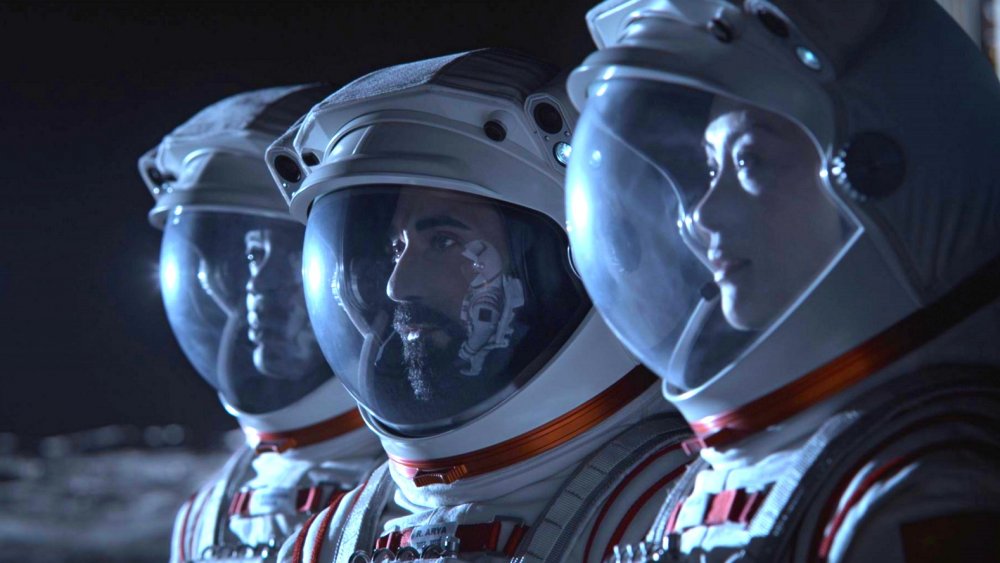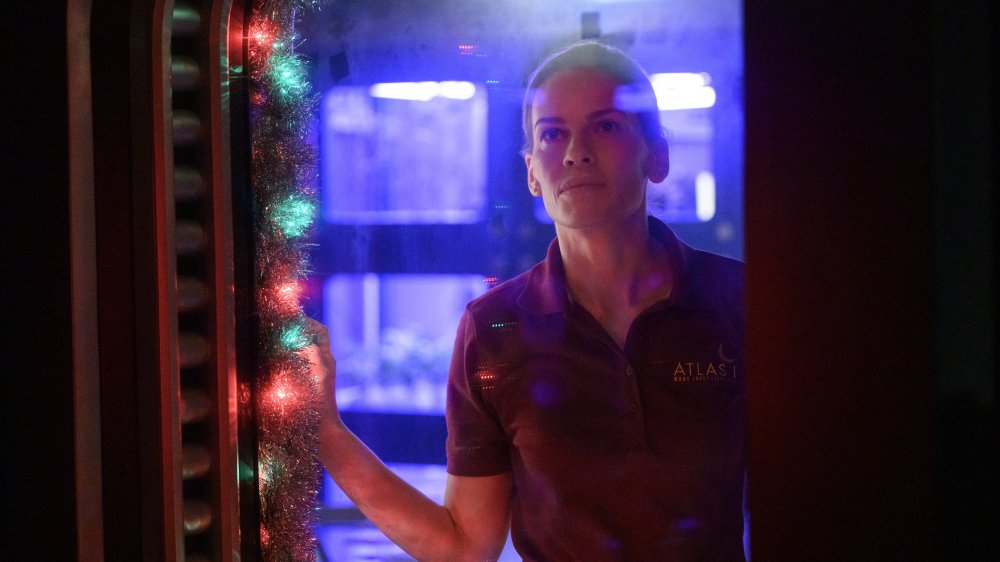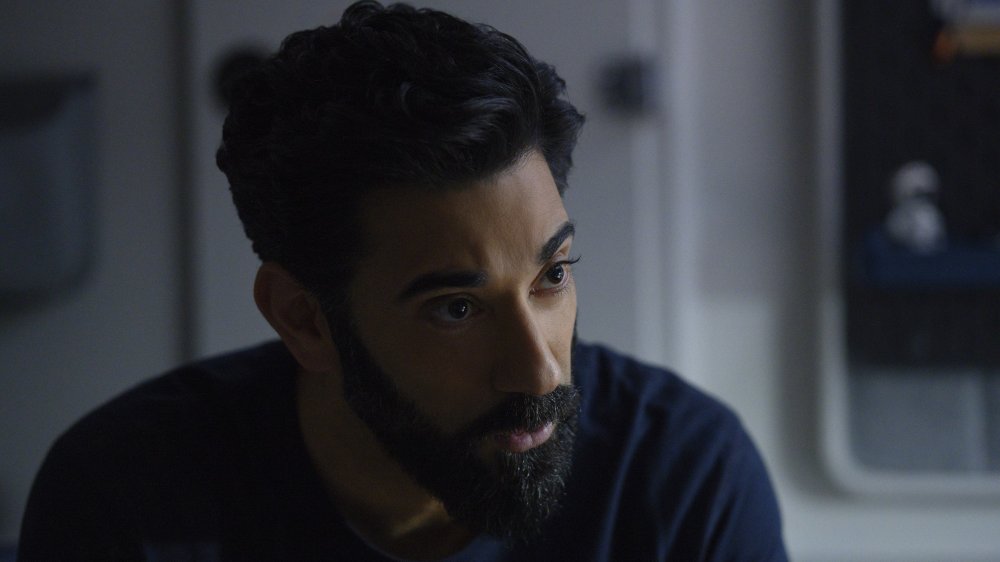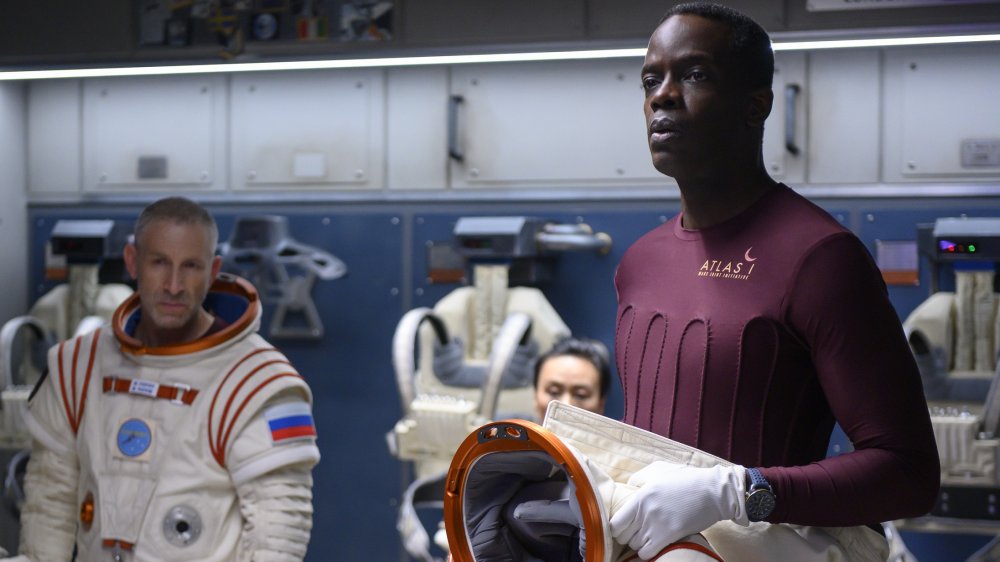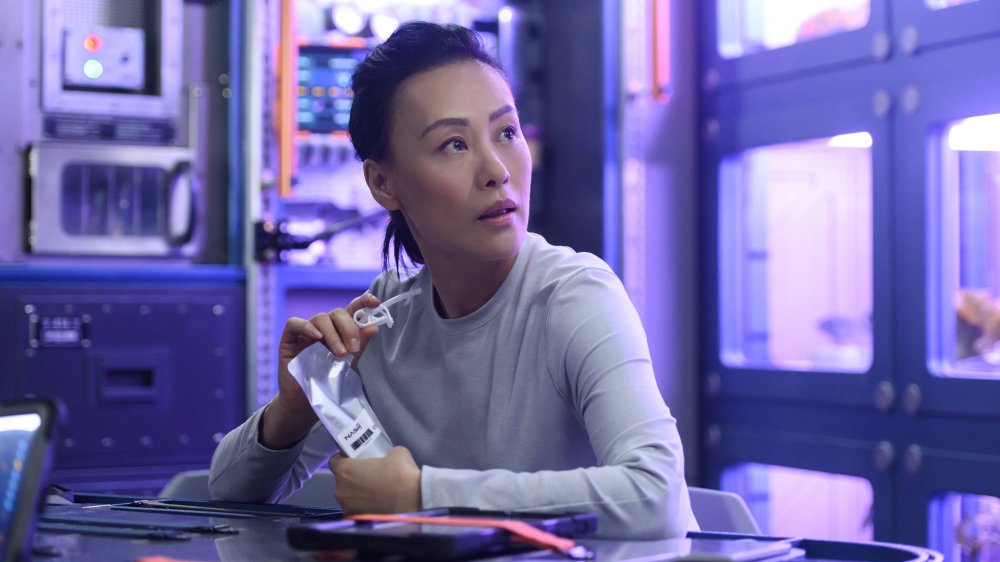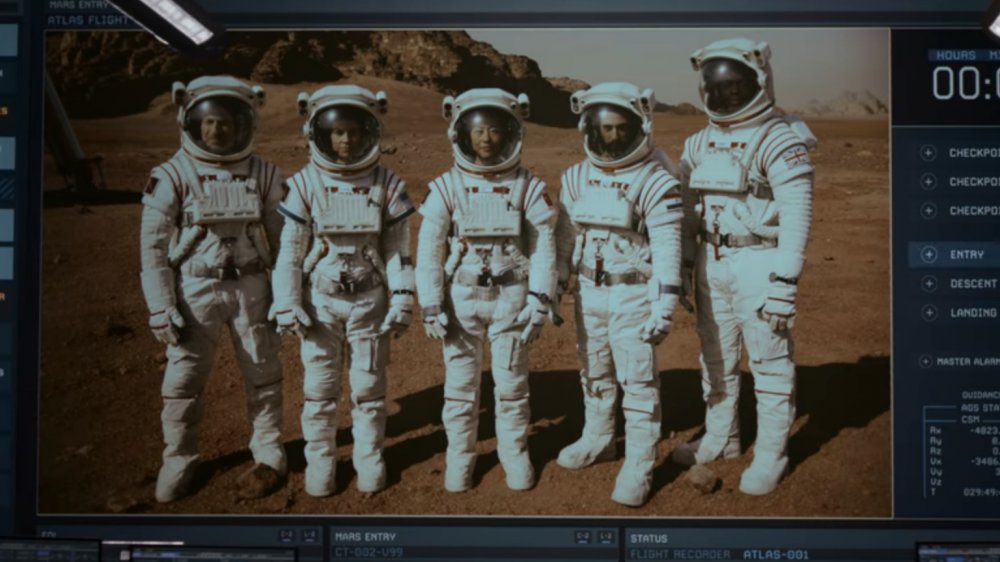The Ending Of Away Season 1 Explained
Netflix's original series Away presents viewers with a thrilling premise: an inside look at the first crewed mission to Mars, made up of a team of international astronauts, balancing their personal lives and their commitment to their countries as they try to work together to do what was once impossible. What could go wrong? As we saw throughout season 1, quite a lot. The crew of the Atlas had to contend with fires, missing supplies, and more personal and political dramas than you could shake a food pouch at.
As the big moment of the finale approached — the crew beginning their descent onto the red planet for the first time — you'd be forgiven for expecting the ship to blow up, or someone to have a heart attack, or any number of other catastrophes that viewers of prestige TV dramas have come to associate with season finales. But Away threw viewers a giant curveball by delivering... a happy ending? In the final moments of the season, the Atlas crew steps onto Mars, becoming heroes in the process and launching the next phase of their mission.
Of course, a lot happened in the finale before Emma Green (Hilary Swank) and her crew got their boots on that red soil. It's time to break down where each member of the crew of the Atlas ended the season, and what could be in store for season 2.
Emma brought the first part of the mission to a successful conclusion
As the leader of the expedition, the crew's safe landing is a moment of intense pride and accomplishment for Emma, but those happy tears didn't come without hardships. In fact, Emma spent the season fighting battles on all fronts. At home, her husband Matt's (Josh Charles) health problems made her question whether she should even be on the mission at all. In space, she faced challenges to her leadership and a host of technical problems that threatened to derail the mission at best, and kill her entire crew at worst.
In the final episodes, she has another issue to contend with: unwanted affection from one of her crew members. Ram's (Ray Panthaki) admission that he's harboring romantic feelings for her leaves Emma feeling frustrated and compromised. However, she's able to diffuse the situation with an assist from Kwesi (Ato Essandoh), and get everyone back on track with prioritizing the completion of their journey.
As though reaching Mars wasn't exciting enough, Emma also learns in the finale that her daughter Lex (Talitha Bateman) tested negative for the gene that has been causing Matt's health problems. It's a truckload of good news for one very tired mission commander.
Ram struggled with being alone in the work
Of all the crew members aboard Atlas, the team's medical officer and second-in-command, Ram Arya, has possibly the saddest backstory (but not the most difficult — we'll get to Lu soon). Early in the season, we learned that Ram is estranged from his family because they've blamed him for his brother's death ever since Ram contracted typhus as a child and inadvertently passed it on to him. While other crew members like Misha (Mark Ivanir) and Emma are struggling to balance their family lives with the all-encompassing nature of their work, Ram is essentially alone in the world.
Clearly, this has deeply affected him. His confession of romantic feelings for Emma feels like a very outward projection of his loneliness. In the end, Kwesi helps put the situation into perspective, giving Ram the boost he needs to help bring the team across the finish line.
When the crew records messages for their families before they begin their descent, Ram's is addressed to his deceased brother. As he delivers it, Emma grabs his hand in a show of emotional support, signaling that despite their tumultuous relationship, being comrades together on this mission matters more than anything else. Even if Ram's romantic feelings aren't reciprocated, it's clear that Emma cares for him deeply.
Kwesi and Misha offered support to their fellow crew members
Although their backstories were certainly fleshed-out, Misha and Kwesi took a bit of a backseat in the finale when it comes to big character moments. Kwesi continued to be guided by his faith, which he used to bolster the spirits of his fellow crew members. He was especially instrumental in helping Ram cope with his difficult situation with Emma, and proved himself to be valuable not just as a botanist, but also as an important source of emotional support for the crew.
Misha similarly spent the finale offering support to Lu. He recognized that her struggle with trying to maintain her individuality, while still acting as a representative for her home country, was wearing on her. When he saw how badly she felt about the possibility of her personal life letting down the Chinese government officials, he took a moment to give her a message of support: "The only thing that matters is the people you love. Whatever you owe them you already paid. If they're not proud of who you really are, they're just stupid fools."
The veteran cosmonaut's personal storyline this season revolved around his difficult relationship with his daughter, Natalya (Olena Medwid), who feels abandoned by her father's devotion to his career. Although there's been no big moment of reconciliation, when the team sends their final messages down to earth, Misha tells his grandkids to be proud of their mother. "She is a hero," he says. "She is my hero."
In the command center, we do see that this message seems to move Natalya, suggesting there may be hope for peace between father and daughter.
Lu took a defiant stand
Other than Emma, it could be argued that Lu is the other Atlas crew member with the most complex storyline. Through flashbacks earlier in the season, we learned that she has been engaged in a secret relationship with Mei Chen (Nadia Hatta), who also works for China's national space program. When the truth of their affair is revealed, Mei is removed from mission command, a clear sign from the government that they don't approve of their star astronaut being in a same-sex relationship.
As China's representative on the mission, Lu knows that she's expected, above all else, to appropriately represent her homeland. The Chinese government has negotiated a deal that ensures that Lu will be the first of the astronauts to step foot on Mars, which will include a photograph of her on the planet that everyone recognizes will go on to become an image of extreme historic importance. In the finale, Emma receives a message from mission command that the Chinese authorities want Lu to keep her reflective visor down when she takes the picture, obscuring her face. This makes Lu feel that she's being erased from her own accomplishment
After some strategic advice from Emma to use her leverage to get China to allow Mei back into mission control, plus a pep talk from Misha, Lu feels emboldened. When she gets a "maybe" from China about her Mei request, Lu recognizes that they are merely trying to appease her for their own gain. Instead of allowing herself to be used as a prop for a patriotic photo op, Lu invites the rest of the crew into the photo with her. They all stand next to one another, visors up, in quiet celebration of their incredible accomplishment.
Where will Away go in a potential second season?
At the moment, Netflix hasn't confirmed whether or not it plans to bring Away back for a second season. Series creator Andrew Hinderaker always planned a multi-season arc for the show (via The Cap Times), and fans are no doubt hopeful that Netflix will let him realize that vision.
Presuming that Away does get another season, what's going to be in store next for the Atlas crew? It seems likely that, as the journey to Mars anchored the action of the first season, the crew's work to establish their Mars base would be the focus of a second. Showrunner Jessica Goldberg also dropped a tantalizing clue about the way the crew's individual spiritual journeys will shape a potential follow-up.
In a discussion with The Wrap about the show's religious themes, Goldberg said that questions of how people of varying faiths would react to this kind of mission came up frequently in the writer's room: "Is there a God? Do you need faith to get through these kinds of missions? What happens if you believe in nothing? What if there is other life out there?'"
That final question is one she hopes to expand on in the next season. "If we get to go on and have a season 2, that question will play even more deeply because the question of life on Mars is the scientific basis, you know, it's the holy grail of what Mars could possibly hold," she said.
Here's hoping Netflix doesn't make viewers wait as long as the journey to Mars for a season 2 renewal.
